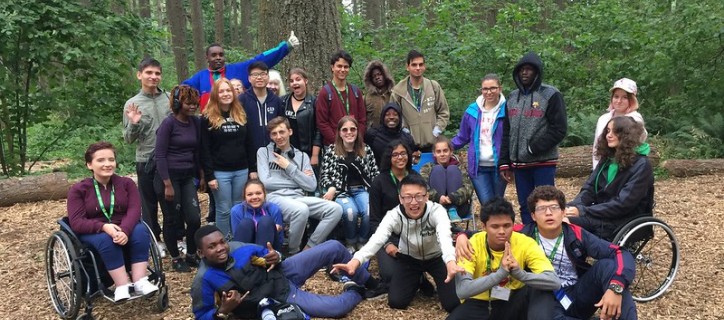The U.S. Department of State funds many exchange programs for professionals, teachers, college students, and high school students to gain leadership experience in the United States. The ECA encourages people with disabilities to apply for all of its funded exchange programs. Check out these four excellent youth exchange programs sponsored by the U.S. Department of State’s Bureau of Educational and Cultural Affairs (ECA).
Future Leaders Exchange (FLEX) Program
The FLEX program provides scholarships for high school students from formerly Soviet Union countries to spend an academic year in the United States living with a volunteer host family and attending a U.S. high school. It was created from the belief of former Senator Bill Bradley that the best way to ensure long-lasting peace and mutual understanding between the U.S. and the countries of Eurasia is to enable young people to learn about the U.S. and Americans firsthand, and to teach Americans about their countries.
While in the U.S., FLEX students gain leadership skills, learn about American society and values, and teach Americans about their home countries and cultures.
“Participating in the FLEX program has been the biggest step towards success in my life so far. If I hadn’t participated in FLEX, I wouldn’t know all of the successful, active, and interesting people I’ve met over the last year, nor would I have learned of countless leadership opportunities.” – Esma Gumberidze, a blind student from Tbilisi, Georgia,
Kennedy Lugar Youth Exchange and Study (YES) Program
Through the U.S. Department of State’s Kennedy-Lugar Youth Exchange and Study (YES) program, high school students from countries with significant Muslim populations live and study for an academic year in the United States. YES students serve as “youth ambassadors” of their home country, promoting mutual understanding by forming lasting relationships with their host families and communities. Participants live with a host family, attend an American high school, acquire leadership skills, and engage in activities to learn about U.S. society and values; they also help educate Americans about their home country and culture.
“My host parents taught me a lot about being a ‘little person’ by inviting me to their association’s activities. It opened my mind, and it changed the way I look at myself. I know what I have learned from them will be helpful for me when I go out into the world to live my own life.” – Marlon Celso, a YES alumnus of short stature from the Philippines
Youth Ambassadors Program
The Youth Ambassadors Program brings together high school students and adult mentors from countries across the Americas to promote mutual understanding, increase leadership skills, and prepare youth to make a difference in their communities.
Exchanges are primarily from Latin America and the Caribbean to the United States, but also include delegations from the United States to select countries.
Participants engage in workshops, community service activities, team building exercises, meetings with community leaders, and homestays with American families. Upon their return home, the students apply what they have learned to implement projects that serve needs in their communities.
“I feel like in Colombia they need to have more people concerned about volunteering, and it is not very popular there. I was surprised to see so many people doing it in the United States.” – Sara Giraldo Gaviria, Youth Ambassadors Program alumnus from Colombia who is visually impaired
Youth Leadership Program
The Youth Leadership Program, a three to four week exchange program for service-oriented young adults from select countries in Africa, Asia and Eastern Europe, between the ages of 15 and 17, is a great way to begin a life of learning through global exploration. During the exchanges, students and educators participate in workshops, community service activities, team building exercises, meetings with community leaders, leadership development, and live with American families. Upon their return home, the students apply what they have learned to implement projects that serve needs in their communities.
Conclusion
These are great opportunities from the U.S. Department of State and other organizations also offer different programs. The website of the Council on Standards for International Educational Travel (CSIET) has a great tool that you can use to search for more. When you find an option that interests you, search for it on our website to see if they have included people with disabilities in the past. Read up on strategies for negotiating reasonable accommodations. Get in touch with us if you have any questions. If you have participated in one of these programs, share your story with us.

